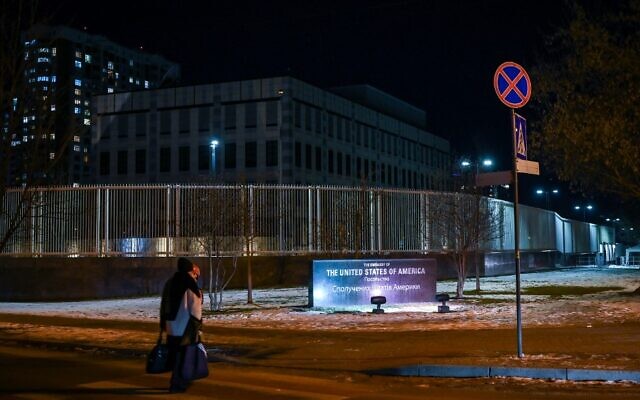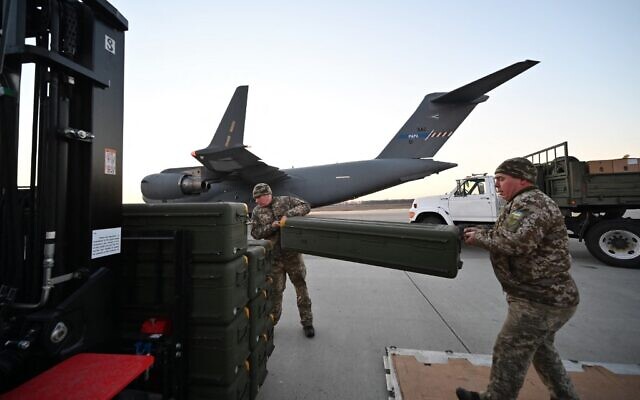Biden, Boris Johnson say there’s still ‘a crucial window for diplomacy’ in Ukraine crisis; Russia said moving some forces to ‘attack positions’

The United States said Monday it is relocating its embassy in Kyiv to the western Ukrainian city of Lviv, citing a “dramatic acceleration” in the buildup of Russian forces at the country’s border.
“The embassy will remain engaged with the Ukrainian government, coordinating diplomatic engagement in Ukraine,” US Secretary of State Antony Blinken said. “We are also continuing our intensive diplomatic efforts to deescalate the crisis.”
Blinken “strongly urged” any remaining US citizens in Ukraine to leave the country immediately.
Staffing at the US embassy in Kyiv had already been drastically reduced after the US ordered the departure of most diplomats and halted consular services.
A small consular presence had already been put in place in Lviv, about 70 kilometers (45 miles) from the Polish border.
At the US embassy in Kyiv, a Ukrainian security official outside the gate told AFP that all Americans had left.
Lights could be seen on the ground floor, but the building in suburban Kyiv was not flying the American flag.

The United States has warned that a Russian invasion of Ukraine could be imminent.
In a phone call Monday, US President Joe Biden and British Prime Minister Boris Johnson agreed that a “crucial window for diplomacy” remained over the crisis in Ukraine, the latter’s office said.
“The leaders emphasized that any further incursion into Ukraine would result in a protracted crisis for Russia, with far-reaching damage for both Russia and the world,” a Downing Street spokesman said of the call between the transatlantic allies.
The two leaders also stressed that diplomatic discussions with Russia remained “the first priority,” and welcomed talks that have already taken place between Russia and NATO allies, according to the spokesman.
“They agreed that Western allies must remain united in the face of Russian threats, including imposing a significant package of sanctions should Russian aggression escalate,” he added.
“They also reiterated the need for European countries to reduce their dependence on Russian gas, a move which, more than any other, would strike at the heart of Russia’s strategic interests.”
The discussion, the latest among world leaders focused on the crisis in Ukraine, comes after US intelligence officials warned an invasion by Moscow into its western neighbor could be days away.
Russia has massed more than 100,000 troops near its Ukrainian border and in neighboring Belarus, where they have been doing joint exercises.

Citing a US official, CBS News reported that Russia was moving long-range artillery and rocket launchers to “attack positions” along the border. The official said the US believes Russia will attack Ukraine by the end of the week, but it remains unclear in what form.
Moscow, which denies it has any plans to invade Ukraine, wants Western guarantees that NATO won’t allow Ukraine and other former Soviet countries to join as members. It also wants the alliance to halt weapons deployments to Ukraine and roll back its forces from Eastern Europe — demands flatly rejected by the West.
At a joint press conference Monday with German Chancellor Olaf Scholz, Ukrainian President Volodymyr Zelensky said joining the NATO alliance would guarantee Ukraine’s survival.
“We understand that NATO membership would ensure our security and our territorial integrity,” Zelensky said.
But he also referred to Ukraine’s NATO ambitions Monday as a “dream.”
“For us, NATO membership is not the absolute goal. That’s not a question that comes from us,” he was quoted as saying by Politico.
Scholz also downplayed the prospect of Ukraine joining NATO.
“The question of [Ukrainian] membership in alliances is practically not on the agenda,” he said.

Germany plays a central role in efforts to mediate in eastern Ukraine, where a grueling conflict with Russian-backed separatists has claimed more than 14,000 lives.
But Berlin’s close business relations with Moscow and heavy reliance on Russian natural gas imports have been a source of lingering concern for Kyiv’s pro-Western leaders and US President Joe Biden’s team.
Scholz has hedged against unequivocally backing Biden’s pledge to “bring an end” to Russia’s new Nord Stream 2 gas link to Germany.
As reported by The Times of Israel
